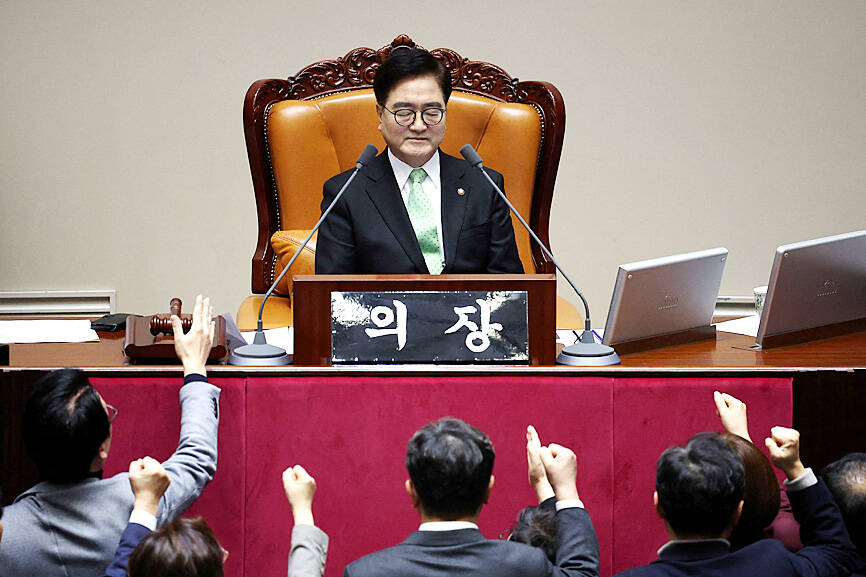The speaker of the South Korean National Assembly yesterday proposed revising the constitution to curb presidential powers, citing public support for such a move after former president Yoon Suk-yeol was ousted for declaring martial law.
“I would like to propose to the people that we should now quickly pursue constitutional revision,” South Korean National Assembly Speaker Woo Won-shik told a news conference. “After going through the unconstitutional and illegal martial law and [then Yoon’s] impeachment, the public consensus on the urgency of constitutional revision is greater than ever.”
He proposed a national referendum on constitutional reform to coincide with the presidential election that must be held within two months of Yoon’s ouster on Friday by the nation’s Constitutional Court.

Photo: Reuters
The court upheld parliament’s impeachment of Yoon for briefly declaring martial law on Dec. 3 last year, sparking South Korea’s worst political crisis in decades.
“The national confusion has come to an end with the Constitutional Court’s ruling, but the potential for destructive conflict surrounding presidential power still exists,” Woo said, adding that many South Koreans want to change the “imperial presidency,” which he called a source of extreme political conflict.
A Gallup Korea opinion survey last month found that 54 percent of people polled support a constitutional revision to fix the presidential system, while 30 percent said it is unnecessary.
Yoon yesterday said that although he had stepped down, he would “always stand by” his supporters, who fought for “freedom and defending sovereignty.”
Acting South Korean President Han Duck-soo and the election commission are considering June 3 for the election, the commission has said.
The constitution was last revised in 1987 to introduce direct presidential elections and a single, five-year term.
In the past few years, presidential candidates from across the political spectrum have supported revisions including giving presidents two four-year terms, but few concrete steps have been taken after new leaders were chosen.
Yoon’s ruling People Power Party is studying possible amendments, and its presidential hopefuls have mentioned barring presidents from seeking more than two four-year terms.

Taiwan is gearing up to celebrate the New Year at events across the country, headlined by the annual countdown and Taipei 101 fireworks display at midnight. Many of the events are to be livesteamed online. See below for lineups and links: Taipei Taipei’s New Year’s Party 2026 is to begin at 7pm and run until 1am, with the theme “Sailing to the Future.” South Korean girl group KARA is headlining the concert at Taipei City Hall Plaza, with additional performances by Amber An (安心亞), Nick Chou (周湯豪), hip-hop trio Nine One One (玖壹壹), Bii (畢書盡), girl group Genblue (幻藍小熊) and more. The festivities are to

Auckland rang in 2026 with a downtown fireworks display launched from New Zealand’s tallest structure, Sky Tower, making it the first major city to greet the new year at a celebration dampened by rain, while crowds in Taipei braved the elements to watch Taipei 101’s display. South Pacific countries are the first to bid farewell to 2025. Clocks struck midnight in Auckland, with a population of 1.7 million, 18 hours before the famous ball was to drop in New York’s Times Square. The five-minute display involved 3,500 fireworks launched from the 240m Sky Tower. Smaller community events were canceled across New Zealand’s

‘IRRESPONSIBLE’: Beijing’s constant disruption of the ‘status quo’ in the Taiwan Strait has damaged peace, stability and security in the Indo-Pacific region, MOFA said The Presidential Office yesterday condemned China’s launch of another military drill around Taiwan, saying such actions are a “unilateral provocation” that destabilizes regional peace and stability. China should immediately stop the irresponsible and provocative actions, Presidential Office spokeswoman Karen Kuo (郭雅慧) said, after the Chinese People’s Liberation Army (PLA) yesterday announced the start of a new round of joint exercises around Taiwan by the army, navy and air force, which it said were approaching “from different directions.” Code-named “Justice Mission 2025,” the exercises would be conducted in the Taiwan Strait and in areas north, southwest, southeast and east of Taiwan

UNDER WAY: The contract for advanced sensor systems would be fulfilled in Florida, and is expected to be completed by June 2031, the Pentagon said Lockheed Martin has been given a contract involving foreign military sales to Taiwan to meet what Washington calls “an urgent operational need” of Taiwan’s air force, the Pentagon said on Wednesday. The contract has a ceiling value of US$328.5 million, with US$157.3 million in foreign military sales funds obligated at the time of award, the Pentagon said in a statement. “This contract provides for the procurement and delivery of 55 Infrared Search and Track Legion Enhanced Sensor Pods, processors, pod containers and processor containers required to meet the urgent operational need of the Taiwan air force,” it said. The contract’s work would be